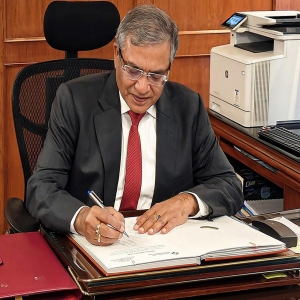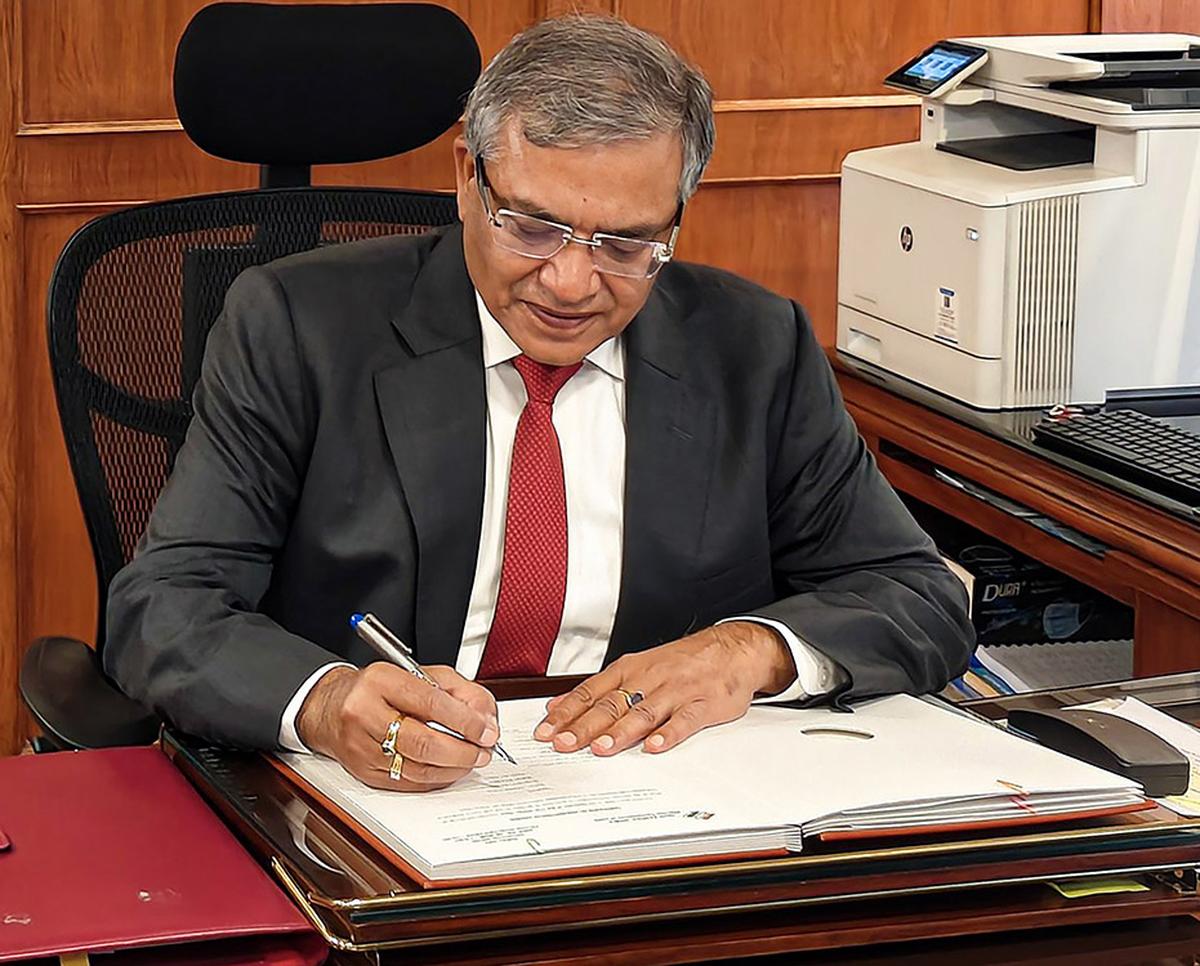

The Constitutional bodies are independent and insulated against arbitrary actions of the Executive. The pillars of democracy – the Legislature, Judiciary, and the Press - are expected to be neutral and non-partisan in discharging their duties, as their appointments, tenure, and service conditions do not depend on the whims and fancies of the government. According to the fundamental Right to Freedom, as outlined in Article 19(1)(a), the Press is free. A free Press is a sine qua non to check the abuse of power by the Executive and the bureaucracy.
However, the government of the day doesn't honour the provisions of the Constitution, and the institutions are under pressure to act according to its diktats. They have quickly adapted to India's 'new normal' and learnt to be pliable to survive. For instance, the Speaker of the Lok Sabha, Om Birla, is refraining from asking the house to elect a Deputy Speaker because the ruling dispensation is not interested in having one. It is constitutionally mandatory to have a Deputy Speaker. Article 93 of the Constitution mandates that "The House of the People shall, as soon as may be, choose two members of the House to be respectively Speaker and Deputy Speaker thereof and, so often as the office of Speaker or Deputy Speaker becomes vacant." This was an established practice till the 16th Lok Sabha.
This constitutional provision is violated by the Modi government with impunity. The 17th Lok Sabha didn't have a Deputy Speaker, and Om Birla, as the Speaker, employed high-handed tactics to silence dissent. He expelled more than 140 MPs in one go to ensure the draconian criminal laws were passed without discussion and debate, with the entire Opposition walking out. In the present 18th Lok Sabha, of which he is the Speaker for a second term, the Deputy Speaker remains unchosen even after a year.
The institution of parliament is downsized. The government doesn't want to have a Deputy Speaker, as, by parliamentary convention, the post will go to the principal opposition party, the Congress, or a member of the INDIA bloc. The Congress President, Mallikarjun Kharge, wrote a letter on June 10, 2025, to Narendra Modi, urging him to initiate the process of electing a Deputy Speaker. He reminded Modi that it was the first time in independent India's history that the post of Deputy Speaker had remained vacant under his regime for two consecutive terms.
Another Constitutional authority, the Election Commission of India—the soul of democracy—is under severe strain. Part XV of the Constitution makes the Election Commission totally independent, and the Commission is expected to conduct free and fair elections to Parliament and state legislatures—the bedrock of democracy—without fear or favour. Yet, the Election Commission has come under severe scrutiny for its failure to act independently as a neutral and impartial umpire.
The election process is questioned by the opposition parties. It is found wanting in giving a satisfactory explanation on the issues raised by the Opposition – be it the announcement of dates for elections, the malfunctioning of the EVMs, the fake and manipulative electoral rolls, the deleting and including names of voters from the voters' lists, the enforcing of the model code of conduct and the like, raising serious doubts about the transparency in the functioning of the Election Commission and its accountability.
Rahul Gandhi, the Leader of the Opposition (LoP) in the Lok Sabha, has been questioning the manner in which the elections for the Maharashtra State Assembly were conducted in November last year. He said his party doesn't accept the election result, which is marred by electoral malpractices. He repeated this charge in the Lok Sabha on February 3 and at various public forums, as well as in his interactions with students, faculty, and the intelligentsia at Brown University in the United States on April 21. His article Match-fixing Maharashtra, in The Indian Express on June 7, 2025 – translated into major Indian languages – has created a stir across India. He made serious charges against the Election Commission for failing to conduct a free and fair election in Maharashtra- the most populous state after Uttar Pradesh.
In the article, he made five specific charges against the Election Commission:
Charge 1: Rig the panel for the appointment of umpires:
The 2023 Election Commissioner Appointment Act ensured that Election Commissioners are effectively chosen by the Prime Minister and the Home Minister by a 2:1 majority, as the third member, the Leader of the Opposition, could always be outvoted. This is what actually happened when Gyanesh Kumar was selected as the new Chief Election Commissioner in February 2025, despite the Leader of the Opposition's dissent. They are choosing their own umpires in a contest where they are the top contestants.
The decision to place a cabinet minister instead of the Chief Justice of India on the selection committee does not pass the smell test. Why should someone go out of the way to remove a neutral arbiter in an important institution? The Committee that selects Election Commissioners excludes the Chief Justice of India. On March 2, 2023, a 5-judge Constitution Bench led by Justice KM Joseph ordered that the selection committee should comprise the Prime Minister, the Leader of the Opposition and the Chief Justice of India. This order of the apex court was just ignored.
Charge 2: Inflate the voter register with fake voters
The Election Commission (EC) data show that the number of registered voters in Maharashtra for the 2019 Assembly election was 8.98 crore, which rose to 9.29 crore by the 2024 Lok Sabha election five years later. Five months later, by the November 2024 Assembly election, the number had leapt to 9.70 crore—a crawl of 31 lakhs in five years, followed by a leap of 41 lakhs in just five months. So incredible was this leap that the registered voter total of 9.70 crore was even greater than the 9,54-crore adults in Maharashtra. It is a clear case of electoral fraud.
Charge 3: Inflate voter turnout figures on top of an inflated voter base
To most participants and observers, voting day in Maharashtra seemed completely normal. As they do elsewhere, voters queued up, cast their votes, and went home. Those voters who had entered the polling booths by 5 pm were permitted to stay until they had cast their votes. There were no reports of unusually long queues or crowding at any voting booth. The polling turnout at 5 pm was 58.22%. Even after voting closed, however, turnout continued to increase. The final turnout was reported only the next morning to be 66.05 per cent. This unprecedented increase of around 8 per cent is equivalent to 76 lakh voters, much higher than the previous Assembly elections. For instance, the difference between the provisional and final turnout of vote percentage is -0.50, 1.08, and 0.54 in 2009, 2014, and 2019, respectively, in the Maharashtra Assembly elections.
Charge 4: Pinpoint targeted bogus voting turned BJP into Bradman
There are approximately 1 lakh booths in Maharashtra, but most of the added voters were targeted in only about 12,000 booths across 85 constituencies where the BJP performed poorly in the last Lok Sabha elections. That is an average of over 600 voters at each booth after 5 pm. The EC described the sharp increase in voters as "a welcome trend in participation of youth." Apparently, this welcome trend was restricted to 12,000 booths and not observed in the remaining 88,000 booths-an amusing joke if it were not tragic. The BJP bagged 132 out of the 149 seats it contested in the 2024 Assembly election, an unprecedented and unbelievable strike rate of around 90 per cent. The BJP's strike rate in the Lok Sabha elections, only five months earlier, was 32%.
Charge 5: Conceal the evidence trail
The Election Commission met all Opposition queries with silence and even aggression. It summarily dismissed requests to make voter rolls with photos available for the 2024 Lok Sabha and Assembly Elections. Even worse, only one month after the Maharashtra Assembly election, and following the Punjab and Haryana High Court Order December 9, 2024, invoking the 1961 rule book directing the EC to submit videography, CCTV footage and copies of papers relating to votes cast at a polling station, the government, with the approval of the EC, amended the 1961 Conduct of Election Rules, Section 93(2)(a) to restrict access to CCTV footage and electronic records, nullifying the High Court Order, in an attempt to cover up and shield the EC.
The Leader of the Opposition, in conclusion, argues: "Voter rolls and CCTV footage are tools to be used to strengthen democracy, not ornaments to be locked up while democracy is violated. The people of India have a right to be assured that no records have been or will be trashed. There exists an apprehension in many quarters that evidence of other fraudulent practices like targeted voter deletion and booth displacement may emerge from the examination of records. There is apprehension that this election rigging playbook has been in play for years. Doubtless, the examination of records will also throw up the modus operandi and the cast of complicit characters. However, the Opposition and the public are blocked at every turn from accessing these records...rigging is like match-fixing… Match-fixed elections are a poison for any democracy."
As expected, Maharashtra Chief Minister Devendra Fadnavis, Union Minister Bhupender Yadav, and BJP President JP Nadda have jumped the gun. They have come out with bizarre stories in the Media, hurling all sorts of abuses against Rahul Gandhi, defending the EC, perhaps relying on unsigned evasive notes passed on by some people purportedly from the EC. Why are the BJP and its leaders answering on behalf of the Election Commission of India?
The Election Commission is in the dock. It must squarely answer point by point the issues raised by the LoP and place them in the public domain. It cannot deny the updated voter lists, CCTV footage, electronic records, etc., of the 2024 Lok Sabha and Assembly elections in Maharashtra under the guise of "protecting the integrity of elections and the privacy of voters."
All that is demanded is a booth-wise voters list and electronic records in a readable format. No one is asking the EC to give the information about which voter voted for which party. There is no question of encroaching on someone's privacy. The EC should know that, under the RTI, there is no such thing as secrecy in the conduct of public functionaries. The public authorities, particularly the EC, are expected to be transparent and accountable for their actions. The Election Commission of India must not be seen as being subservient to the government, forgetting its constitutional obligation to conduct free and fair elections and act as an impartial umpire to maintain the people's faith in democracy and the electoral process. And evading will not protect its credibility as much as telling the truth.
The charges against the Election Commission by the Leader of the Opposition are too serious. Supreme Court must take suo motu cognisance of the charges and order an independent inquiry to safeguard democracy and its institutions. It is not cheating on a small scale, but rather 'industrial-scale rigging'.